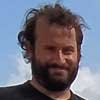Food Systems Podcast 40
In discussion with Konstantinos Afianes Podcast summary
Thursday, Feb 03, 2022
How wine links to health and nature
Our latest podcast takes us to Ikaria, in the Aegean ocean, where Konstantinos Afianes is producing natural, sustainable wines. The island is known for the longevity of its population – so what are the secrets of the islanders’ health, and how can wine production continue against the intensely hot weather produced by climate change? For a taster, read our short summary below, or dive into the full 22-minute Food Systems Podcast for much more.
Tell us a bit about Afianos Wines, the vineyards and Ikaria.
We started in 1997. My parents had a lot of passion about the history of the island. People had been forced to leave after the phylloxera plague at the end of the 19th Century . It destroyed 90% of European vineyards. Wine-making rebooted after the Second World War. There was always huge potential.
Like your parents, you produce natural wines, rather than processed. How did that start?
My father’s main profession is a pharmacist. He knows how important people’s well-being is, and he always tried to avoid using chemicals. So I learned wine-making the natural way. Then when I studied in France I saw the most industrialized way. I came back having learned what not to do.
As a farmer, do you receive any support?
When we started the winery in 2007 we had some funds from the EU. We had first applied in 2002, so by 2007 everything – materials, building – was about twice the price. So we still have a loan to pay back. There’s a lot of hassle with the bureaucracy. With the pandemic, we’ve also had help.
Is climate change having an impact on the vineyards and on the island?
The situation is changing drastically. This year we saw the greatest impact of all. From 400 metres altitude, coming down to the sea, we had a lot of heat and just before the harvest severe fires. We lost about 60%. But anything above 400 metres flourished. Fortunately, we didn’t have any significant diseases. We’re in survival mode. We’re forced to plant at higher altitudes where it’s cooler. A lot of our vineyards are experimental, we have different patches at every altitude.
Ikaria is famous for being a Blue Zone – one of only five places in the world with high longevity. Why is that?
It’s a family-centric lifestyle which is closer to nature than in the city. People have time to think about themselves – to meet people, to bring wine, to enjoy dinner together, supporting each other in the bad moments and the good moments. I missed this when I was abroad.
What about the diet on Ikaria. Should it, or could it, be more widely adopted?
Everything begins with the soil – that’s the No 1 priority, to have clean land without chemicals. If you have clean land, you can start thinking about the rest, food, vegetables etc. We’re talking about a biocentric model, which is the only one that’s sustainable. We have to focus on that.
Is the traditional lifestyle coming under threat?
We are big on tourism nowadays. We’re not like the big islands, but in August the situation is dire! My main concern is that Ikaria does not get taken over by tourism and money, and we lose our values.
What are your plans for the future of the vineyard?
We’ve set goals which are all around environmental sustainability. Our goal is not the wine – that’s the final thing. The projects we have are to make us as autonomous as possible for the winery in the future. We are recycling the water we use in the winery, because we have high usage, and adding solar panels. In the vineyards we only use compost we produce from the leftovers of the harvest.
Can you share one piece of advice that would really make a difference and increase the sustainability of the food system?
We have to think long-term, improve our techniques of, say, organic farming so that we can feed more and more people without destroying the environment. We need to search deeper and deeper into techniques to return to the natural world.
If you have found this short summary interesting, there’s lots more to hear in the full 25-minute conversation. It is available now on iTunes, Podbean or Spotify or on this website.

Konstantinos Afianes
Konstantinos Afianes, who studied wine-making in Bordeaux, France, is co-owner of the Afianes Vineyard, which was founded almost 20...see more
